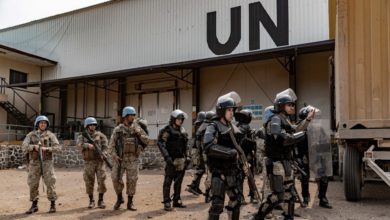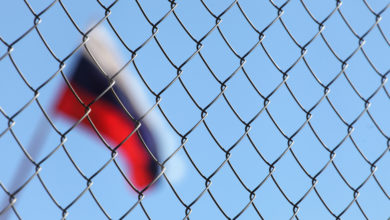How Russia’s Invasion of Ukraine Could Change the Global Order Forever

Vladimir Putin declared war with Ukraine Wednesday using tanks and rockets.
The optics of the President of Russia, a permanent member of the U.N. Security Council, announcing the invasion of a sovereign nation during an emergency meeting of its members—presided over by Russia’s U.N. ambassador, no less—were stark: the ultimate repudiation of the rules-based world order that the organization embodies.
U.N. Secretary-General Antonio Guterres was shocked enough to call it the “saddest moment in my tenure.” Though as the bombardment of Ukrainian cities escalated alongside the testiness of exchanges inside the chamber, feelings shifted to outrage at the impotence of members’ calls for peace and dialogue.
[time-brightcove not-tgx=”true”]
Learn More: Here’s What We Know So Far About Russia’s Assault on Ukraine
“At the exact time as we were gathered in the council seeking peace, Putin delivered a message of war in total disdain for the responsibility of this council,” said U.S. permanent representative Linda Thomas-Greenfield. “This is a grave emergency.”
It would be reductive to attribute these failings simply to Putin’s belligerence. It’s been an open secret that global governing institutions have been broken for a long time, spotlighted by a series of recent crises that have received limp attention: the annexation of Crimea, the COVID-19 pandemic, the return of the Taliban to power in Afghanistan, popular uprising in Kazakhstan, coup d’état in Myanmar, and now, most drastic of all, invasion of Ukraine.
“It’s the biggest crisis since World War II, in the [heart] of Europe, and will have huge consequences,” former Mongolian President Tsakhiagiin Elbegdorj told TIME on Thursday. “It will require great effort to settle this issue and update the world order.”

It is unclear if and how this could happen. After the Cold War ended, many believed that the world was now different. For a little more than a decade liberal democracies lost their power as economic success has increased in non-democracies. The old fractures are back.
“It seems that the old Cold War tensions never really went away,” former Thai Prime Minister Abhisit Vejjajiva tells TIME. “It’s almost as if we’re back to a situation of war and potential flash points around the world.”
Biden’s Administration condemned Beijing Wednesday as it was responsible for this shift. “Russia and [China] also want a world order,” U.S. State Department spokesman Ned Price told reporters. “But this is an order that is and would be profoundly illiberal, an order that stands in contrast to the system that countries around the world … have built in the last seven decades.”
Part of the blame should be attributed to the U.S.’s hubris in not strengthening international institutions during the 70-year period when the United States was the dominant power. We still use the Bretton Woods economic institutions, which established global rules for trade and commerce. The West was largely the one who called the shots until recent due to the power and wealth of America, as well as the strength of European countries.
Learn More ‘We Will Defend Ourselves.’ Photographs of Ukraine Under Attack
Today, however, Washington finds itself unable to freely exert its will as a result of Beijing’s swelling economic and diplomatic clout. It is telling that four U.N. special agencies are headed by Chinese officials. In January, China was the only U.N. Security Council member to vote with Russia in a failed attempt to stop a U.S.-requested meeting regarding Moscow’s troop build-up at its border with Ukraine.
Russia, however, has amazingly coopted U.N. Charter 2(4)’s language about sovereignty and territorial integrity in order to justify its actions. “So it’s sort of claiming the mantelpiece of international order, while fundamentally and quite dramatically undermining it,” says Leslie Vinjamuri, dean of the Queen Elizabeth II Academy for Leadership in International Affairs at Chatham House.
The difference between Beijing and Moscow, says Rana Mitter, professor of the history and politics of modern China at Oxford University, is that the former wants to influence the international order to its own benefit from within, while the latter wants to tear it up entirely: “Because of the kind of state that China wants to be, that is globalized in terms of its trading capacity but able to be as self-sufficient as possible at home, the international order actually suits it very well.”
It is a greater challenge to the West than any Cold War when it was facing a nation that was a powerful military but was weak economically. With China, “all of a sudden we’re looking at a country that has the economic capability to take us all on,” says Iain Duncan Smith, an MP and former leader of the U.K. Conservative Party. “That means the rule-based order can be debauched, which is what’s happening now.”

Beijing backs international organizations and accords aligned to its interests, such as Paris climate pacts or the World Bank. But where Beijing’s interests diverge from established norms, especially human rights, it aims to corrupt those values and bring in alternative models. Beijing cooperates with Moscow, other liberal nations, and others to promote standards in areas where there are no standards. These institutions themselves are weak, so it is able to do this.
“The problem is that when we had a world order that was new and good, we never really stepped up in terms of getting the multilateral or international organizations to play a lead role,” says Abhisit.
Learn More Why Sanctions on Russia Won’t Work
China’s ambivalence on Putin’s aggression against Ukraine spotlights the new normal. While calling for “dialogue and negotiation” on Thursday, Chinese Foreign Minister Wang Yi effectively gave his blessing to the invasion, telling his Russian counterpart, Sergei Lavrov, on a call that “the Chinese side understands Russia’s legitimate security concerns.”
“Beijing thinks this one’s probably going to bypass China, as it is a war between two European countries,” says Mitter. “And that the role of NATO and the United States is really what’s at the heart of the dispute.”
It’s wrong to think of inaction as completely new, though. In truth, the exceptional moments in U.N. history have been when consensus has been reached among the P5—the officially recognized nuclear-weapons states—to stand up for the international order when one of them was involved. “It just doesn’t happen,” says Vinjamuri. “So this [kind of Ukraine situation] isn’t really out of keeping; it’s built into the structure of the U.N.”
It will be important to see if Putin is subjected to serious sanctions. Japan, Australia, Canada and the U.K. have all imposed sanctions on Russian banks, as well as wealthy cronies of Putin. Germany also stopped certification for Nord Stream 2’s gas pipeline. China and other Kremlin allies can probably compensate. China’s bilateral trade with Russia increased 33.6% in the past year to $140 billion by 2021. Pakistan Prime Minister Imran Khan was in Moscow on Wednesday to discuss, among other things, the $2.5 billion Pakistan Stream gas pipeline, which Moscow wants to build between Karachi and Kasur, expressing bewilderment at arriving during “so much excitement.”

Can there be any chance for the world’s established order to survive? Abhisit suggests that rather than dismantling existing institutions, we need to encourage them in order to solve these types of conflicts.
“The [Ukraine] situation has escalated due to pure mistrust,” he says. “Russia is uncomfortable with having NATO installed on its doorstep. Ukraine feels threatened. And the West is suspicious of Russian motives.” A meaningful discussion about the expansion of NATO and the sovereignty of Ukraine by a neutral party might have led to a more desirable outcome, he adds. “I don’t pretend it’s easy, but I can’t see that happening when it’s just being dealt with by the conflicting parties.”
Learn More Russia’s Assault on Ukraine Poses Huge Risques for Europe and the World
Suzanne Nossel, CEO of Penn America and a former Deputy Assistant Secretary of State for International Organizations under Barack Obama, has argued that states must be forced to go through a written public process every time they exercise a U.N. veto, so that their arguments become subject to the scrutiny of the international community, and that the U.N. General Assembly should be more empowered to act when the Security Council doesn’t.
Many would agree that Wednesday marked a low point for both the U.N. as well as global governance in general. “The international system, the U.N., is not really effective,” says Elbegdorj, who studied in Lviv, western Ukraine, for five years during the 1980s. “It’s just talking heads now, not really having any impact, and these forces [allied] with Putin know the situation.”





